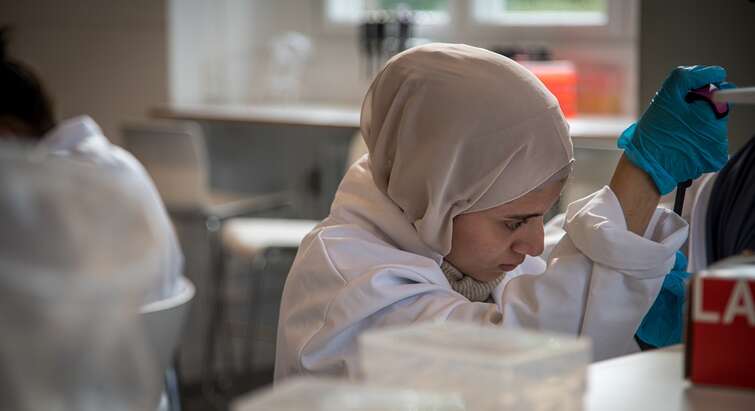
The biodiversity crisis: Worse than climate change
Biodiversity
Biodiversity is declining rapidly throughout the world. The challenges of conserving the world’s species are perhaps even larger than mitigating the negative effects of global climate change. Dealing with the biodiversity crisis requires political will and needs to be based on a solid scientific knowledge if we are to ensure a safe future for the planet. This is the main conclusion from scientists from University of Copenhagen, after 100 researchers and policy experts from EU countries were gathered this week at the University of Copenhagen to discuss how to organise the future UN Intergovernmental Panel for Biodiversity and Ecosystem Services, IPBES - an equivalent to the UN panel on climate change (IPCC).
 Species extinction and the degradation of ecosystems are proceeding rapidly and the pace is accelerating. The world is losing species at a rate that is 100 to 1000 times faster than the natural extinction rate.
Species extinction and the degradation of ecosystems are proceeding rapidly and the pace is accelerating. The world is losing species at a rate that is 100 to 1000 times faster than the natural extinction rate.
Mass extinctions of species have occurred five times previously in the history of the world – last time was 65 million years ago when the dinosaurs and many other species disappeared. Previous periods of mass extinction and ecosystem change were driven by global changes in climate and in atmospheric chemistry, impacts by asteroids and volcanism. Now we are in the 6th mass extinction event, which is a result of a competition for resources between one species on the planet – humans – and all others. The process towards extinction is mainly caused by habitat degradation, whose effect on biodiversity is worsened by the ongoing human-induced climate change.
"The biodiversity crisis – i.e. the rapid loss of species and the rapid degradation of ecosystems – is probably a greater threat than global climate change to the stability and prosperous future of mankind on Earth. There is a need for scientists, politicians and government authorities to closely collaborate if we are to solve this crisis. This makes the need to establish IPBES very urgent, which may happen at a UN meeting in Panama City in April," says professor Carsten Rahbek, Director for the Center for Macroecology, Evolution and Climate, University of Copenhagen.
A biodiversity equivalent to the UN panel on climate change
Professor Rahbek was one of the main forces behind this week’s conference on biodiversity and the organisation of the new Biodiversity panel IPBES (Intergovernmental Platform for Biodiversity and Ecosystem Services). The conference was arranged and hosted in cooperation with the Danish Ministry of Environment and took place at the University of Copenhagen, where more than 100 scientists and decision makers, primarily from EU countries were gathered. The conference has been organised just as Denmark is taking over the EU Presidency, which provides an opportunity to influence the process of organising the UN Biodiversity Panel.
The new panel is the biodiversity equivalent to the UN panel on climate change, which has resulted in enhanced policy awareness and changes around the world, and initiated a change of behaviour for billions of people in many companies. Unfortunately, the same is not true when it comes to reducing the threats to ecosystems and the loss of animal and plant species.
"There is a need to produce future scenarios that are easily understood and at the same time bring together the best scientists in this field. It is technically possible to develop such scenarios, if they are requested by decision-makers and politicians involved in the IPBES process. The myth that university scientists cannot or will not contribute to concrete solutions of large-scale society problems in close collaboration with practitioners, decision makers and politicians has been shown to be untrue through our close engagement in the organisation and participation in these workshops. The collaboration between the Danish Ministry of Environment, the EU presidency and University of Copenhagen over organising this conference is a successful example of how universities can contribute in dealing with some of the largest challenges that face the world at large," states Carsten Rahbek.
The Center for Macroecology, Evolution and Climate at University of Copenhagen led by Carsten Rahbek and producing world class research within biodiversity is arranging this conference in cooperation with the ministry of environment and EPBRS, European Platform for Biodiversity Research Strategy supported by EEA.
Further information:
Professor Carsten Rahbek
Mobile: +45 40 96 39 67
The Convention on Biological Diversity
UN Environment Program on biodiversity
Intergovernmental Platform on Biodiversity and Ecosystem Services
Topics
Related News
Contact information
Prof. Dr. Carsten Rahbek
Center for Macroecology, Evolution & Climate, Department of Biology, University of Copenhagen
Phone: +45 40 96 39 67
E-mail: crahbek@bio.ku.dk
Communications Officer Svend Thaning
The Faculty of Science
Mobile: +45 28 75 42 81
Email: svt@science.ku.dk
The Biodiversity crisis
Acknowledging that the Earth's biological resources are vital to humanity's economic and social development, the Convention on Biological Diversity has been signed by 192 countries and the European Union. Because it is a treaty to sustain the rich diversity of life on Earth, it is crucially concerned with species extinctions and ecosystem degradation.
In 2002, a 2010 Biodiversity Target was set to reduce the current rate of biodiversity loss, and the United Nations declared 2010 to be the International Year of Biodiversity. After some years in the shadow of the global climate change agenda, dealing with the biodiversity crisis is prominently back on the world political agenda with the highly successful Nagoya Biodiversity Summit COP 10 meeting in fall of 2010. Subsequently, on the 21st of December, 2010, the United Nations 65th General Assembly formally resolved to establish an Intergovernmental Platform on Biodiversity and Ecosystem Services (IPBES), and January 2011 was declared the beginning of the International Decade on Biodiversity.
The work-program and how to secure the quality of future IPBES assessments reports is currently being discussed around the world. In these days, the Center for Macroecology, Evolution and Climate, University of Copenhagen is hosting a conference together with the EU Precidency with representatives from all European countries aimed to formulate the EU standing on these issues. Center leader, Professor Carsten Rahbek and Professor Neil Burgess from University of Copenhagen is playing key roles in this process.


